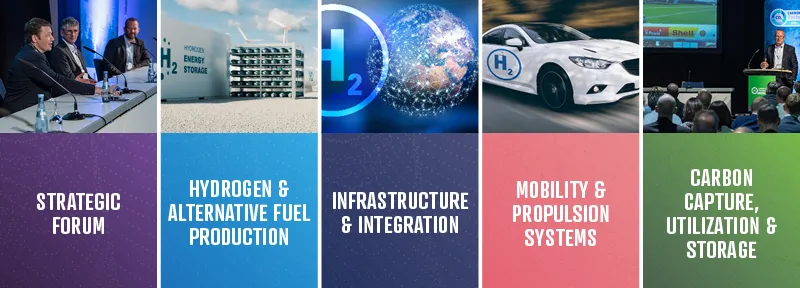Q&A with Hendrik Meller, Project Director of German Global Hydrogen Diplomacy
)
Hendrik Meller, Project Director of German Global Hydrogen Diplomacy, shared how Germany aims to support fossil fuel exporting countries on the future role of green hydrogen, possible ways to transport hydrogen, Germany’s hydrogen production plans and insights on the geopolitics of the energy transition in an email correspondence with Hydrogen Technology World News, the official newsletter of the Hydrogen Technology Expo,
- Why has Germany launched a dedicated hydrogen diplomacy strategy with offices in a few countries?
Germany’s Federal Foreign Office has been on the forefront to link global decarbonisation and energy transition to foreign policy and diplomatic strategies. In this regard the Federal Foreign Office launched the Global Hydrogen Diplomacy (H2-Diplo) programme which is implemented by the Deutsche Gesellschaft für Internationale Zusammenarbeit (GIZ).
H2-Diplo contributes to Germany’s National Hydrogen Strategy, by fostering a dialogue specifically with fossil fuel exporting countries on the future role of green hydrogen in a decarbonising world. H2-Diplo aims to support these countries by discussing alternatives for diversification of the respective economies early on to ensure that fossil fuel exporting countries are well prepared to contribute with their extensive sector knowledge and resources to the global market development for carbon neutral hydrogen.
- How many offices have opened so far and how are the locations for these offices decided?
The H2-Diplo programme has officially launched 3 offices in key places like Riyadh (Saudi Arabia), Luanda (Angola) and Abuja (Nigeria). They provide a platform for dialogue between partner country and German institutions as well as European stakeholders. These countries are among the world’s most important fossil fuel exporters and therefore are of great political significance also in the context of their respective region.
- How many more offices could be launched in the future and where?
As part of the H2-Diplo project a hydrogen diplomacy office in Kyiv, Ukraine, is also foreseen. However, due to the Russian war of aggression against Ukraine the launch is currently postponed. As soon as possible H2-Dipo will start engaging with Ukrainian Government on this topic. As hydrogen has become a staple of many foreign dialogues today, H2-Diplo supports German embassies also in places where no specific Hydorgen Diplomacy Offices exist.
- Currently hydrogen transportation over long distances is deemed very challenging, how feasible is it to import hydrogen fuel from geographically far countries in the short-term?
Currently most transportation methods are not fully commercialized and are only operated at a pilot/demonstration level (e.g., liquid hydrogen, liquid organic hydrogen carriers both with early stage projects in the Asia Pacific region). Whether it will be feasible to utilize this technologies at a larger scale is yet to be seen and a recent IRENA report estimates that these technologies will only see a niche application, typically for shorter distances. The report highlights ammonia as predominant hydrogen carrier or transport method. Ammonia is already shipped globally today which means many countries have already existing loading/unloading infrastructure at ports and dedicated ships exist.
As green ammonia has the same chemical properties as conventional/grey ammonia which is currently shipped, there are no issues to use the same infrastructure. Also, ammonia transportation costs only add very little extra cost compared to the overall cost of the landed product. At the same time ammonia transportation costs are only to a limited degree sensitive to the transport distance, in particular in cases where large tankers can be utilized. Nonetheless it is most likely that imports will happen from closer proximity in the near-term as green hydrogen will require every cost reduction it can realize to compete with other alternatives.
- As part of REPowerEU, the European Commission has announced plans to produce 10 million tonnes of H2 domestically, what steps will Germany take to contribute to this happening?
The German government aims for an installed green hydrogen production capacity of 10 GW by 2030. Depending on how this capacity is operated it could produce between 2-4 million tonnes of H2. In order to achieve this capacity target, measures include but are not limited to:
- The National Hydrogen Strategy earmarked EUR 9 bn for the development of a hydrogen economy of which EUR 7 bn are earmarked for the ramp-up of a local market including production, transportation and end-use.
- Launch of Important Project of Common European Interest (IPCEI) with focus on the full hydrogen value chain also in cooperation with other EU member states.
- Launch of a Carbon Contracts for Difference scheme to support hydrogen adoption in heavy industry.
- Regulatory sandboxes where hydrogen ecosystems can be piloted and demonstrated.
Additionally the national hydrogen strategy of Germany is currently undergoing revision with an updated version to be published later this year which means targets, funding and mechanisms could potentially be extended.
- Do you think hydrogen will play an integral role in shifting the geopolitical landscape? Why?
Hydrogen, moreover the global energy transition as such, has the potential to disrupt our current understanding of the geopolitical landscape of the energy sector due to several reasons, the main ones being.
- Endowment: With fossil fuels there are only a few countries with substantial resources. While many of these are also well endowed with renewable resources to produce green hydrogen, there are also many other countries that are currently not exporting energy carriers who are poised to become major players in green hydrogen and derivatives exports (e.g., Chile, Namibia). On top of that, even countries who do not have access to the cheapest renewable resources, like many countries in Europe, will still be able to produce a fair share of their future hydrogen consumption within their own country. As such energy access has the potential to become more dezentralized, one might even say: democratized, between countries through green hydrogen and its derivates.
- International energy security: Due to the widespread availability of resources to produce green hydrogen, there is a chance that the international trade market will be a lot more diverse than today’s international trade of oil and gas. With a more diverse playing field, energy security of countries like Germany can be enhanced by leveraging multiple sources of imports, thereby reducing dependence on a few entities.
- Change of game: As oil and gas demand is poised to decline over the coming decades current exporters of fossil fuels will have to adjust to avoid the disruption of their current economies and business models. One chance to adjust is to move the exploration game of oil and gas to the production game of green hydrogen and derivates,
- Industrial diversification: In addition to the gradual shift from oil and gas to green hydrogen, industrial diversification beyond hydrogen can also strengthens economies. As green hydrogen production and export will likely move to where it is cheapest there is a high probability that industries, which require green hydrogen as a feedstock or fuel, will move to where the hydrogen is produced. This is in particular true if transportation of hydrogen (except for ammonia) remains a challenge and costly. Industries where this could hold true are the steel, metal and chemicals industry but also synfuels production and potentially industries which could utilize hydrogen as a heat source, such as cement or minerals processing (e.g., glass, ceramics production). Through industry reallocation, new interdependencies but potentially also a more diverse international playing field for these products could ensue.



)
)
)
)
)
)
)
)


)
)
)
)
)
)
)

)
)
)
)
)
)
)
)

)
)
)
)
)
)
)

)
)
)
)

)
)

)
)
)
)
)
)
)
)

)
)
)
)
)

)
)

)
)
)
)
)
)
)
)


)
)


